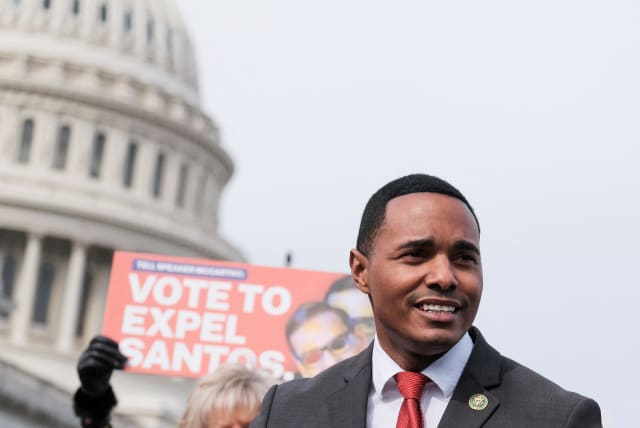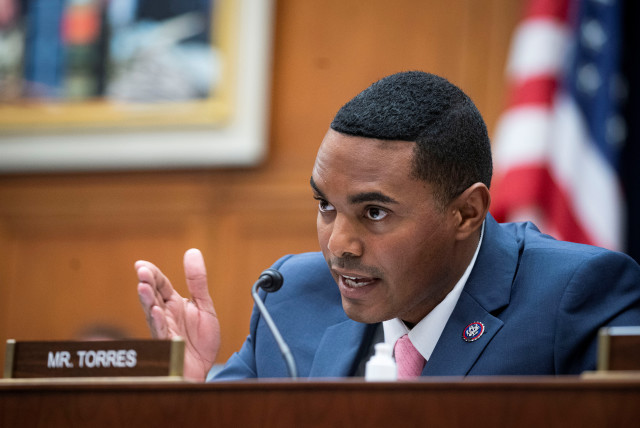Pro-Israel Rep. Ritchie Torres left the Congressional Progressive Caucus. Or did it leave him?

Torres was first elected to represent his Bronx district in 2020, becoming one of the first two gay Black members of Congress.
This week, Rep. Ritchie Torres posted two tweets about issues that directly affect his Bronx constituents: funding centers for mental health care and public safety on the subway.
Sandwiched in between was a third post echoing the core talking point of pro-Israel activists since Oct. 7: “The international community remains obsessed with pressuring Israel and only Israel,” Torres tweeted. “How about pressuring Hamas to release the hostages, surrender unconditionally, and end a war it started?”
The first two posts help explain why Torres joined the Congressional Progressive Caucus, a powerful coalition championing the low-income constituents and urban neighborhoods that Torres represents. The third helps explain why he has left.
Sometime between December and January, Torres was removed from the membership page of the Congressional Progressive Caucus, the largest subgroup among Democrats in the US House of Representatives, with more than 100 members.
Who initiated the breakup is not clear. Neither Torres nor his spokesman would comment, and the caucus’s media arm likewise did not return a request for comment.
But his departure surprised no one among his backers and allies, coming after months of tension between Torres and progressive Democrats who object to his outspoken support for Israel in its war with Hamas.
Torres was first elected to represent his Bronx district in 2020, becoming one of the first two gay Black members of Congress. Like the lawmaker representing the neighboring district, Rep. Alexandria Ocasio-Cortez, Torres, 35, is young and of Puerto Rican descent. Unlike AOC and many other young, progressive Democratic congresspeople, he has been a vocal supporter of Israel since before taking office, an identity he has embraced since Oct. 7, when Hamas attacked Israel and launched the war.
Departure from the Congressional Progressive Caucus
Now, his departure from the Congressional Progressive Caucus formalizes that split — and illustrates an identity crisis faced by pro-Israel Jews who identify as progressive but who now find themselves at odds with a movement they once embraced.
“It is not difficult to be a progressive and be pro-Israel,” Archie Gottesman, a leading pro-Israel advocate who has gotten to know Torres through her work on the board of Democratic Majority for Israel, a pro-Israel PAC that backs Torres, said Wednesday. “It is difficult to be pro-Israel with other progressives, right now.”
Torres has said his affection for Israel stems from his time as a member of the New York City Council. In 2015, he traveled to Israel with colleagues at the invitation of the city’s Jewish Community Relations Council. In October, he told Politico that he sees Israel as a “sanctuary for the Jewish people” and was affected by visits to the ancient Jewish fortress of Masada, the Yad Vashem Holocaust museum and the embattled city of Sderot on the Gaza border.
“It was the first time I had an opportunity to travel abroad. And my experience in Israel was love at first sight,” Torres said. “It was one of the most formative and transformative experiences of my life.”
That unyielding support for Israel has also drawn powerful backers to Torres. In addition to DMFI, his top contributor in 2022 was AIPAC, the pro-Israel lobby, according to the campaign finance database OpenSecrets.
But Torres’ identification with Israel has increasingly become an outlier on the progressive left. Other members of the Congressional Progressive Caucus have grown increasingly distant from the country, a trajectory accelerated by the rightward drift of Israel’s government.
That gap was growing before Oct. 7 — Rep. Pramila Jayapal, the caucus chair, called Israel a “racist state” last summer and then walked it back — and it has since accelerated. Now, dozens of members of the caucus have called for a ceasefire in Gaza. Some outspoken Israel critics in the caucus have taken aim at Torres directly.
“Will you be fine if all of the people of Gaza were gone? Would that make you happy?“ Rep. Ilhan Omar of Minnesota said at an October press conference. “Maybe that’s the question you should ask Ritchie: Is he OK? How many more Palestinian lives is he comfortable with? Because I am not comfortable with any more.”
Torres shot back on CNN, saying, “The war was imposed on Israel by the barbaric terrorism of Hamas.” He has also condemned the rhetoric of Rep. Rashida Tlaib, who is Palestinian-American. And he has roundly rejected calls for a ceasefire, including in a speech to a massive November pro-Israel rally in Washington.
“Not everyone who’s calling for a ceasefire wants Israel to cease to exist,” Torres said. “But everyone who wants Israel to cease to exist is calling for a ceasefire. Hamas and Hezbollah and the Islamic Republic of Iran are all calling for a ceasefire. Our answer to them is no!” The crowd erupted into cheers.
Torres is not the first representative to leave the caucus over its approach to Israel. Rep. Lois Frankel, a Jewish Florida lawmaker, left the caucus in November for that reason.
Haile Soifer, CEO of the Jewish Democratic Council of America, noted that the caucus maintains a sizable contingent aligned with pro-Israel communities: Members include Reps. Brad Sherman and Juan Vargas of California, Jamie Raskin of Maryland and Dan Goldman of New York. But she understood why Torres no longer was comfortable in the caucus.
“I understand those who have felt pushed out, because in the aftermath of Oct. 7, it’s clear that Israel has been a divisive issue,” she said. “Even if he felt that he didn’t have a home any longer in the caucus, it doesn’t change how he identifies his views.”
In many other respects, Torres aligns with progressives. The top three agenda items on his House web page are affordable housing, including a universal housing voucher program; increasing the minimum wage to $15 and empowering unions; and integrating de-facto segregated schools in addition to canceling student debt.
On legislation, Torres joins with progressives in seeking recognition and rights for the LGBTQ community, wage protection and infrastructure spending in cities. He’s also an outspoken advocate for Puerto Rico, a cause he also frames in classically progressive language.
“I call on the Senate to join the people’s House in decolonizing the people of Puerto Rico!” he said in a floor speech in 2022 after the Puerto Rico Status Act, which would allow Puerto Ricans to determine their destiny through statehood, independence or sovereignty in association with the United States, passed in the House. The bill died in the Senate.
Brian Katulis, a senior fellow at the Middle East Institute think tank who has been affiliated with progressive groups, said that for Torres, there’s no contradiction between progressivism and pro-Israel advocacy. Torres, who was brought up by a single mother in a housing project, found much to identify with in a country founded in adversity that has since thrived.
“I think his own personal struggles and how he sees his own life unfolding, I think he has a deep sympathy for what Israel’s faced through the years and and continues to face on Oct. 7 and the aftermath,” Katulis, who himself once left a Democratic-leaning think tank over what he called its “illiberal” views on Israel and other foreign policy issues, said in an interview last month.
“Privately when I met with him through various social engagements, I was like, wow,” Katulis said. “It snapped my head in terms of seeing this young Black Puerto Rican gay guy who’s, like, full-throated, offering a values-based agenda from the left that was supportive of Israel. I was like, ‘This guy gets it.’”
Pro-Israel Democrats have celebrated Torres as a model: someone who criticizes Israel’s government — he has repeatedly called for the ouster of far-right Israeli officials — but loves and stands up for the country, which was once commonplace among US progressives.
“I walked away thinking, ‘This guy is going to be a superstar,’ just in general,” Mark Mellman, the director and founder of Democratic Majority for Israel, said of the first time he met Torres. “And second, that he was unbelievably pro-Israel.”
Torres is leaning into that affection. He marked Martin Luther King Day last month with a speech likening anti-Israel protesters who celebrated the Oct. 7 massacres to white people who celebrated lynchings a century ago.
And pro-Israel Jews have embraced him back. A political action committee dedicated to his reelection is named ChutzPAC. DMFI and the Jewish Democratic Council of America both deployed Torres as a surrogate in the recent special election in Long Island, where he was seen as an asset in swinging the Jewish vote.
“Jewish groups love hearing from him because he shares our values on every issue,” said Soifer. “Certainly, we’re very closely aligned on domestic policy issues and on Israel. You cannot have a stronger champion than Ritchie Torres. It’s not just talking points. It’s something that he feels.”
Jerusalem Post Store
`; document.getElementById("linkPremium").innerHTML = cont; var divWithLink = document.getElementById("premium-link"); if (divWithLink !== null && divWithLink !== 'undefined') { divWithLink.style.border = "solid 1px #cb0f3e"; divWithLink.style.textAlign = "center"; divWithLink.style.marginBottom = "15px"; divWithLink.style.marginTop = "15px"; divWithLink.style.width = "100%"; divWithLink.style.backgroundColor = "#122952"; divWithLink.style.color = "#ffffff"; divWithLink.style.lineHeight = "1.5"; } } (function (v, i) { });

